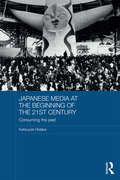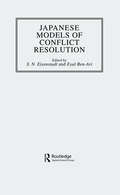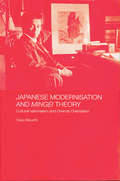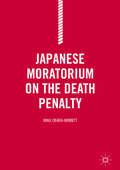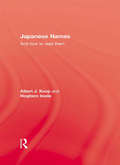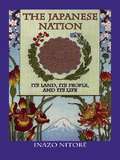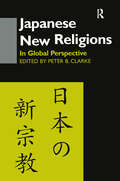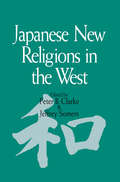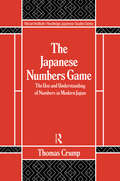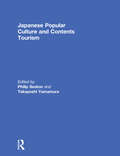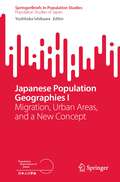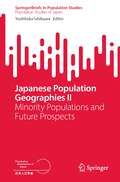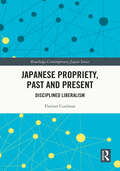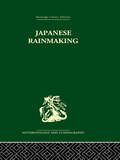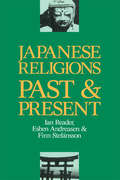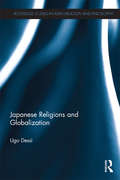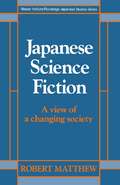- Table View
- List View
Japanese Media at the Beginning of the 21st Century: Consuming the Past (Routledge Contemporary Japan Series)
by Katsuyuki HidakaHailed by Japanese critics as a milestone in the study of contemporary Japanese media, this book explores the contemporary ‘boom’ in Japanese media representations of the recent past. Recent years have seen the production of an unprecedented number of films, animation, manga, and television programmes representing a deeply nostalgic longing for the Japanese heyday of high economic growth in the 1960s and occasionally the 1970s known in Japan as the Shōwa ‘30s and ‘40s. Hidaka provides a comprehensive account of an under researched contemporary Japanese media phenomenon by exploring why this nostalgia has been sparked at this particular historical juncture and how that period is represented in the Japanese media today. The book accomplishes this through a detailed textual and narrative analysis of representative films and television programmes, in relation to their social and cultural context. While these nostalgic media renderings are seen by many critics as innocuous, this study demonstrates that they do not show a simple yearning for the period, but reflects a growing discontent with Japanese post-war society. In this regard, this book concludes that the current nostalgia wave is a critical reaction to the recent past as it seeks to revise historiography through a processes of introspection within popular conceptions of the meta narrative of ‘nostalgia’. Winner of the Japan Communication Association 2015 Outstanding Book Award.
Japanese Models Of Conflict Reso
by EisenstadtFirst Published in 1990. Routledge is an imprint of Taylor & Francis, an informa company.
Japanese Modernisation and Mingei Theory: Cultural Nationalism and Oriental Orientalism
by Yuko KikuchiConceptualised in 1920s Japan by Yanagi Sôetsu, the Mingei movement has spread world wide since the 1950s, creating phenomena as diverse as Mingei museums, Mingei connoisseurs and collectors, Mingei shops and Mingei restaurants. The theory, at its core and its adaptation by Bernard Leach, has long been an influential 'Oriental' aesthetic for studio craft artists in the West. But why did Mingei become so particularly influential to a western audience? And could the 'Orientalness' perceived in Mingei theory be nothing more than a myth? This richly illustrated work offers controversial new evidence through its cross-cultural examination of a wide range of materials in Japanese, English, Korean and Chinese, bringing about startling new conclusions concerning Japanese modernization and cultural authenticity. This new interpretation of the Mingei movement will appeal to scholars of Japanese art history as well as those with interests in cultural identity in non-Western cultures.
Japanese Moratorium on the Death Penalty
by Mika Obara-MinnittOffering a timely reanalysis of the issue of Japan's capital punishment policy, this cutting edge volume considers the de facto moratorium periods in Japan's death penalty system and proposes an alternative analytical framework to examine the policy. Addressing how the Ministry of Justice in Japan justified capital punishment policy during the de facto moratorium periods from 1989 to 1993, from 2009 to 2010 and from 2010 to 2012, the author debates the misconceptions surrounding the significance of these moratoriums. The book evidences the approach, rationale and evolution of Japan's Ministry of Justice in consistently justifying capital punishment policy during the different execution-free periods and provides a better understanding of the powerful unelected elite who actually drive the capital punishment system in Japan. Based on parliamentary proceedings, public opinion surveys and periodical reports by both international and domestic human rights NGOs as well as interviews of government ministers, NGO staff, pro- and anti-death-penalty advocates, this text is key reading for those interested in Japan, its government, criminal justice system and policies on the death penalty and human rights.
Japanese Names & How To Read: A Manual For Art-collectors And Students, Being A Concise And Comprehensive Guide To The Reading And Interpretation Of Japanese Proper Names Both Geographical And Personal As Well As Of Dates And Other Formal Expressi
by KoopFirst published in 2005. Routledge is an imprint of Taylor & Francis, an informa company.
Japanese Names and How to Read Them: A Manual for Art Collectors and Students
by H. Inada A. J. KoopLong established as the standard reference tool for the identification of Japanese names on works of art, and is therefore essential for collectors, galleries, auction-houses, restorers and students. A reprint of the first (1923) edition.
Japanese Nation
by Nitobé InazoThis is an important document in the history of Japanese-American relations. In 2002, President Bush spoke of the great Japanese scholar and statesman Inazo Nitobe, who envisioned a future of friendship between the two nations. This book is one of the means by which Nitobe sought to bridge the Pacific. Writing before World War I, he presents a detailed account of Japan and the Japanese in terms easily understandable to western readers, emphasising points of similarity rather than difference, often citing the work of western historians and philosophers in order to explain Japanese practices, always searching for common aims and goals. He deals with the effect of the past on the present, national characteristics, religious beliefs, morals and moral ideals, education, economic conditions, Japan as coloniser, relations between the United States and Japan, and America’s influence in the Far East, concluding with the hope that wherever else war may break out, lasting peace would reign over the Pacific. In this he was disappointed, but the fact that Nitobe is cited today as the architect of Japanese-American friendship makes this volume essential reading for the historian.
Japanese New Religions in Global Perspective
by Peter B. Clarke Peter B ClarkeSince the 1960s virtually every part of the world has seen the arrival and establishment of Japanese new religious movements, a process that has followed quickly on the heels of the most active period of Japanese economic expansion overseas. This book examines the nature and extent of this religious expansion outside Japan.
Japanese New Religions in the West
by Jeffrey Somers Peter B. ClarkeAn excellent and very timely update on an area seeing many recent developments.
Japanese Noh Plays
by NogamiFirst published in 2005. Routledge is an imprint of Taylor & Francis, an informa company.
Japanese Notebooks: A Journey to the Empire of Signs
by IgortJapan is a place of special fascination for the acclaimed international comics creator Igort, who has visited and lived there more than 20 times, and worked in the country's manga industry for more than a decade. In this masterful new book—part graphic memoir, part cultural meditation—Igort vividly recounts his personal experiences in Japan, creating comics amid the activities of everyday life, and finding inspiration everywhere: in nature, history, custom, art, and encounters with creators including animation visionary Hayao Miyazaki. With beautifully illustrated reflections on subjects from printmaking to Zen Buddhism, imperial history to the samurai code, Japanese film, literature, and manga, this is a richly rewarding book for anyone interested in Japan or comic arts practiced at the highest level.
Japanese Numbers Game: The Use And Understanding Of Numbers In Modern Japan (Nissan Institute/Routledge Japanese Studies)
by T CrumpAn almost obsessional use of numbers characterizes Japanese popular culture. A wide variety of numerical formulae and strategies provide the means for explaining events and solving problems occurring in everyday life. These include such matters as the choice of the name for a child, ranking in almost any game or sport, the diagnosis and cure of illness or the decision to accept a new job. This text provides a general study of the field of Japanese popular numeracy. It introduces the reader to a world of numbers in which fortune-telling, the abacus and games involving numbers, as well as curious numerical names (of both people and places), illustrate the importance of systems of counting, calculation and forecasting. The study explores the cultural roots of attitudes towards numbers and makes suggestions about the contemporary implications of a culture in which mechanical numeracy (and number obsession) is general but the highest levels of academic mathematics still fall short of world standards.
Japanese Politicians’ Rhetorical and Indirect Speech: Verbal and Nonverbal Communication Usage (The Language of Politics)
by Ken KinoshitaThis book presents a new approach to the analysis of political psychology, political culture, and communication. Using data from Japanese political interviews and parliamentary deliberations, it reveals how Japanese politicians address their audience. In addition to analyzing the use of verbal political rhetoric, the book shows that nonverbal communication is highly relevant as well. In a context where political leaders are becoming increasingly important, identifying the techniques used by Japanese politicians – especially facial expressions, hand gestures, and other forms of body language – to gain support from the audience, leads us to consider communication practices of political leaders around the world. Politicians adopt different communication styles based on their specific electoral system. The more single-seat constituency political candidates use rhetoric, the greater their chance of appealing to voters. In addition, the use of personal experiences and others' speech quotations function as effective political rhetoric, further attracting the audience’s attention. In short, this book presents a more comprehensive and holistic picture of political “rhetoric” than usually offered by other studies of political communication.
Japanese Popular Culture and Contents Tourism
by Philip Seaton and Takayoshi YamamuraContents tourism is tourism induced by the contents (narratives, characters, locations and other creative elements) of films, novels, games, manga, anime, television dramas and other forms of popular culture. Amidst the boom in global interest in Japanese popular culture, the utilization of popular culture to induce tourism domestically and internationally has been central to the "Cool Japan" strategy and, since 2005, government policy for local community revitalization. This book presents four main case studies of contents tourism: the phenomenon of "anime pilgrimage" to sites appearing in animated film; the travel behaviours and "pop-spiritualism" of female history fans to heritage sites; the collaboration between local community, fans and copyright holders that underpinned an anime-induced tourism boom in a small town north of Tokyo; and the large-scale economic impacts of tourism induced by NHK’s annual samurai period drama (Taiga Drama). It is the first major collection of articles published in English about media-induced tourism in Japan using the "contents tourism" approach. This book will be of particular interest to students and researchers of media and tourism studies in Asia. This book was previously published as a special issue of Japan Forum.
Japanese Popular Music: Culture, Authenticity and Power (Media, Culture and Social Change in Asia #Vol. 9)
by Carolyn S. StevensJapanese popular culture has been steadily increasing in visibility both in Asia and beyond in recent years. This book examines Japanese popular music, exploring its historical development, technology, business and production aspects, audiences, and language and culture. Based both on extensive textual and aural analysis, and on anthropological fieldwork, it provides a wealth of detail, finding differences as well as similarities between the Japanese and Western pop music scenes. Carolyn Stevens shows how Japanese popular music has responded over time to Japan's relationship to the West in the post-war era, gradually growing in independence from the political and cultural hegemonic presence of America. Similarly, the volume explores the ways in which the Japanese artist has grown in independence vis-à-vis his/her role in the production process, and examines in detail the increasingly important role of the jimusho, or the entertainment management agency, where many individual artists and music industry professionals make decisions about how the product is delivered to the public. It also discusses the connections to Japanese television, film, print and internet, thereby providing through pop music a key to understanding much of Japanese popular culture more widely.
Japanese Population Geographies I: Migration, Urban Areas, and a New Concept (SpringerBriefs in Population Studies)
by Yoshitaka IshikawaThis is the first anthology that conveys in detail the actual situation of population geographies in Japan, a country facing some of the world's most serious demographic trends such as low fertility, population aging, and depopulation. The anthology consists of two volumes with the common title Japanese Population Geographies. All of the included entries are based on original Japanese papers written by leading geographers and published within the past few years, useful for understanding Japan’s current population geographies. The first volume analyzes the postwar transition of internal migration, examining the structural changes of population in urban areas, and proposes a new measure different from the traditional resident population. This volume also presents an investigation of the retirement migration of baby boomers as well as displacement migration due to the 2011 Great East Japan Earthquake. The second volume’s contents examine the residential choices of minority populations such as foreign residents and sexual minorities. It also discusses future prospects associated with mono-polar concentration into Tokyo, regional forecasting using population projections based on small-area units, and the importance of a politico–economic perspective in the future research. Taken as a whole, this anthology offers the following two significant contributions. First, the excellent achievements obtained in Japan, which is experiencing serious demographic trends, reflect key developments within the context of the world's population geography. The second contribution is that the book brings the latest insights and important policy implications to countries that are facing various issues associated with decreasing fertility, aging population, and declining population.
Japanese Population Geographies II: Minority Populations and Future Prospects (SpringerBriefs in Population Studies)
by Yoshitaka IshikawaThis is the first anthology that conveys in detail the actual situation of population geographies in Japan, a country facing some of the world's most serious demographic trends such as low fertility, population aging, and depopulation. The anthology consists of two volumes with the common title Japanese Population Geographies. All of the included entries are based on original Japanese papers written by leading geographers and published within the past few years, useful for understanding Japan’s current population geographies. The first volume analyzes the postwar transition of internal migration, examining the structural changes of population in urban areas, and proposes a new measure different from the traditional resident population. This volume also presents an investigation of the retirement migration of baby boomers as well as displacement migration due to the 2011 Great East Japan Earthquake. The second volume’s contents examine the residential choices of minority populations such as foreign residents and sexual minorities. It also discusses future prospects associated with mono-polar concentration into Tokyo, regional forecasting using population projections based on small-area units, and the importance of a politico–economic perspective in future research. Taken as a whole, this anthology offers the following two significant contributions. First, the excellent achievements obtained in Japan, which is experiencing serious demographic trends, reflect key developments within the context of the world's population geography. The second contribution is that the publication brings the latest insights and important policy implications to countries that are facing various issues associated with decreasing fertility, aging population, and declining population.
Japanese Propriety, Past and Present: Disciplined Liberalism (Routledge Contemporary Japan Series)
by Florian CoulmasThis book thus offers a fresh view on Japanese society focussing on the role of comportment for group cohesiveness. It explores the stereotype that Japan is the world’s most polite country, examining how proper conduct is acquired and expressed, and how the apparent conflict with some of the concepts considered essential for Western modernity, such as society, freedom and the individual, are balanced with Japan’s great emphasis on courtesy, politeness and civility. By comparing the present situation in Japan with behavioural standards of former periods as well as with other cultural traditions the book explains some of the distinctive features of present-day Japanese society. Overall the book argues that Japan is a prime example of multiple modernities concerning individuals, collectives and relationships between state and society.
Japanese Rainmaking and other Folk Practices
by Geoffrey Bownas Pauline BrownThe ritual of rainmaking is one of half a dozen Japanese folk practices and festivals described in this book. The story of rainmaking ceremonies begins with personal experience and then draws on the work of Japanese folklorists to record significant local variations and to construct a general account of the history and purpose of the ceremony. Field research was conducted during study visits to Kyoto, to Tenri in Nara Prefecture and to Shiga Prefecture. The chapter order follows the year cycle, from New Year via early summer purificatory festivals and rainmaking ceremonial to the feast of Bon, which with New Year ceremonies divides the year. Alongside these community or public rites are described private or family rituals concerned with birth, marriage and death. The introductory chapter relates aspects of Japanese culture, myth and language to the constant features of folk practice recorded or extant in 1950s Japan. Originally published in 1963.
Japanese Religions Past and Present
by Ian Reader Esben Andreasen Finn StefanssonEach of the eight chapters deals with a specific topic, such as Shinto, Buddhism, the new religions, and Christianity; there is an introduction that outlines the subject to be considered followed by a series of readings.
Japanese Religions and Globalization
by Ugo DessìThis book analyzes the variety of ways through which Japanese religions (Buddhism, Shintō, and new religious movements) contribute to the dynamics of accelerated globalization in recent decades. It looks at how Japanese religions provide material to cultural global flows, thus acting as carriers of globalization, and how they respond to these flows by shaping new glocal identities. The book highlights how, paradoxically, these processes of religious hybridization may be closely intertwined with the promotion of cultural chauvinism. It shows how on the one hand religion in Japan is engaged in border negotiation with global subsystems such as politics, secular education, and science, and how on the other hand, it tries to find new legitimation by addressing pressing global problems such as war, the environmental crisis, and economic disparities left unsolved by the dominant subsystems. A significant contribution to advancing an understanding of modern Japanese religious life, this book is of interest to academics working in the fields of Japanese Studies, Asian history and religion and the sociology of religion.
Japanese Religions at Home and Abroad: Anthropological Perspectives
by Hirochika NakamakiIn this important book, a leading authority on Japanese religions brings together for the first time in English his extensive work on the subject. The book is important both for what it reveals about Japanese religions, and also because it demonstrates for western readers the distinctive Japanese approaches to the study of the subject and the different Japanese intellectual traditions which inform it. The book includes historical, cultural, regional and social approaches, and explains historical changes and regional differences. It goes on to provide cultural and symbolic analyses of festivals to reveal their full meanings, and examines Japanese religions among Japanese and non-Japanese communities abroad, exploring the key role of religion in defining Japanese ethnic identity outside Japan.
Japanese Schoolgirl
by Brian Ashcraft Shoko Ueda"The schoolgirl is the main driver of Japan's Gross National Cool, and Brian Ashcraft's book is the best source for those hoping to understand why. "#151;Chris Baker, WIRED Magazine Japanese Schoolgirl Confidential takes you beyond the realm of everyday girls to the world of the iconic Japanese schoolgirl craze that is sweeping the globe. For years, Japanese schoolgirls have appeared in hugely-popular anime and manga series such as Dragon Ball, Sailor Moon, The Melancholy of Haruhi Suzumiya, and Blood: The Last Vampire. These girls are literally showing up everywhere#151;in movies, magazines, video games, advertising, and music. WIRED Magazine has kept an eye on the trends emerging from these stylish teens, following kick-ass schoolgirl characters in videogames like Street Fighter and assassin schoolgirls in movies like Quentin Tarantino's Kill Bill. By talking to Japanese women, including former and current J-Pop idols, well-known actresses, models, writers, and artists#151;along with famous Japanese film directors, historians and marketers#151;authors Brian Ashcraft and Shoko Ueda (who have both contributed to WIRED's "Japanese Schoolgirl Watch" columns) reveal the true story behind Japan's schoolgirl obsessions. You'll learn the origins of the schoolgirls' unusual attire, and how they are becoming a global brand used to sell everything from kimchi to insurance. In Japanese Schoolgirl Confidential, you'll discover: Sailor-suited pop-idols Cult movie vixens Schoolgirl shopping power The latest uniform fashions Japanese schoolgirls are a symbol of girl empowerment. Japanese Schoolgirl Confidential shows why they are so intensely cool. Don't miss this essential book on the Japanese youth culture craze that is driving today's pop culture worldwide. "Whether your preferred schoolgirl is more the upstanding heroine Sailor Moon or the vengeful, weapon-wielding Gogo Yubari of Quentin Tarantino's Kill Bill, Vol. 1, you'll come away well versed. "#151;Publishers Weekly
Japanese Schoolgirl Confidential
by Shoka Ueda Brian Ashcraft"The schoolgirl is the main driver of Japan's Gross National Cool, and Brian Ashcraft's book is the best source for those hoping to understand why."-Chris Baker, WIRED MagazineJapanese Schoolgirl Confidential takes you beyond the realm of everyday girls to the world of the iconic Japanese schoolgirl craze that is sweeping the globe.For years, Japanese schoolgirls have appeared in hugely-popular anime and manga series such as Dragon Ball, Sailor Moon, The Melancholy of Haruhi Suzumiya, and Blood: The Last Vampire. These girls are literally showing up everywhere-in movies, magazines, video games, advertising, and music. WIRED Magazine has kept an eye on the trends emerging from these stylish teens, following kick-ass schoolgirl characters in videogames like Street Fighter and assassin schoolgirls in movies like Quentin Tarantino's Kill Bill.By talking to Japanese women, including former and current J-Pop idols, well-known actresses, models, writers, and artists-along with famous Japanese film directors, historians and marketers-authors Brian Ashcraft and Shoko Ueda (who have both contributed to WIRED's "Japanese Schoolgirl Watch" columns) reveal the true story behind Japan's schoolgirl obsessions.You'll learn the origins of the schoolgirls' unusual attire, and how they are becoming a global brand used to sell everything from kimchi to insurance. In Japanese Schoolgirl Confidential, you'll discover: Sailor-suited pop-idols Cult movie vixens Schoolgirl shopping power The latest uniform fashionsJapanese schoolgirls are a symbol of girl empowerment. Japanese Schoolgirl Confidential shows why they are so intensely cool. Don't miss this essential book on the Japanese youth culture craze that is driving today's pop culture worldwide."Whether your preferred schoolgirl is more the upstanding heroine Sailor Moon or the vengeful, weapon-wielding Gogo Yubari of Quentin Tarantino's Kill Bill, Vol. 1, you'll come away well versed."-Publishers Weekly
Japanese Science Fiction: A View of a Changing Society (Nissan Institute/Routledge Japanese Studies)
by Robert MatthewAfter the Meiji Restoration of 1868 Japan modernized rapidly, transforming itself perhaps more quickly than any other country in history. However, the change was not without its conflicts, many of them still unresolved as the pleasures of modern society vie with a respect for the traditional Japanese lifestyle. As the literature of change and of the young, science fiction acts as a window to the modern mind and the uneasy alliance of the old and new. This book, filled with detailed reference to numerous stories, traces the origin and development of the genre from the mid-nineteenth century to today, thus exploring unique insights into Japanese attitudes to commercialism, spirituality, the media, war and international relations.
